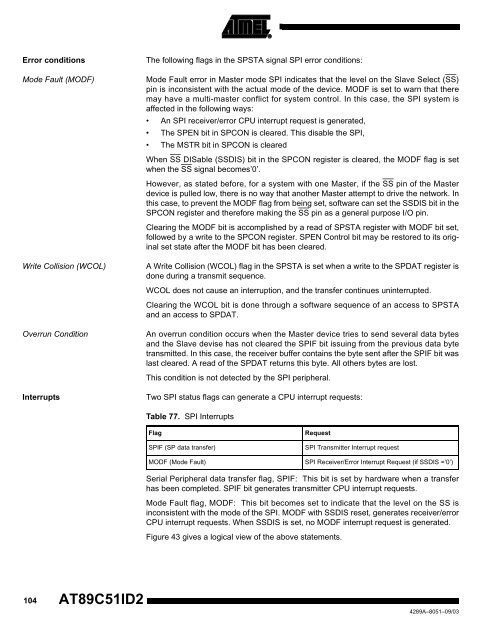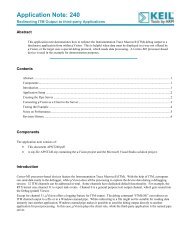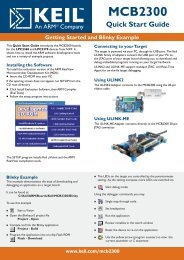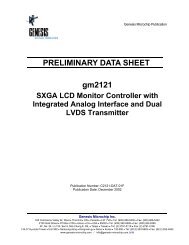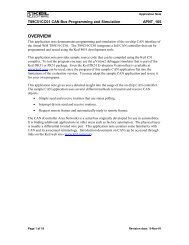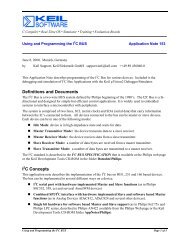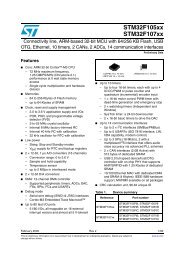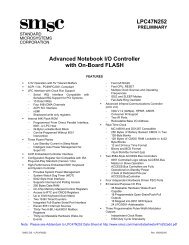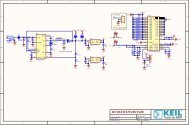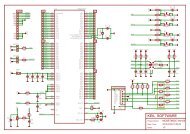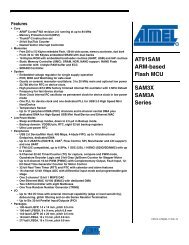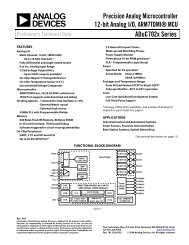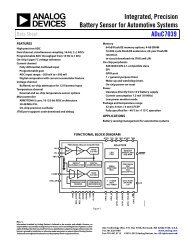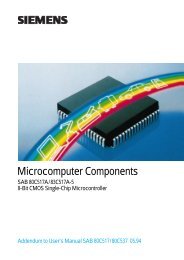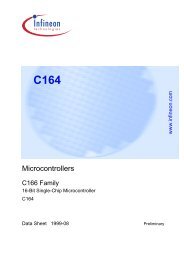Create successful ePaper yourself
Turn your PDF publications into a flip-book with our unique Google optimized e-Paper software.
Error conditions The following flags in the SPSTA signal SPI error conditions:<br />
Mode Fault (MODF) Mode Fault error in Master mode SPI indicates that the level on the Slave Select (SS)<br />
pin is inconsistent with the actual mode of the device. MODF is set to warn that there<br />
may have a multi-master conflict for system control. In this case, the SPI system is<br />
affected in the following ways:<br />
An SPI receiver/error CPU interrupt request is generated,<br />
The SPEN bit in SPCON is cleared. This disable the SPI,<br />
The MSTR bit in SPCON is cleared<br />
When SS DISable (SSDIS) bit in the SPCON register is cleared, the MODF flag is set<br />
when the SS signal becomes’0’.<br />
However, as stated before, for a system with one Master, if the SS pin of the Master<br />
device is pulled low, there is no way that another Master attempt to drive the network. In<br />
this case, to prevent the MODF flag from being set, software can set the SSDIS bit in the<br />
SPCON register and therefore making the SS pin as a general purpose I/O pin.<br />
Clearing the MODF bit is accomplished by a read of SPSTA register with MODF bit set,<br />
followed by a write to the SPCON register. SPEN Control bit may be restored to its original<br />
set state after the MODF bit has been cleared.<br />
Write Collision (WCOL) A Write Collision (WCOL) flag in the SPSTA is set when a write to the SPDAT register is<br />
done during a transmit sequence.<br />
WCOL does not cause an interruption, and the transfer continues uninterrupted.<br />
Clearing the WCOL bit is done through a software sequence of an access to SPSTA<br />
and an access to SPDAT.<br />
Overrun Condition An overrun condition occurs when the Master device tries to send several data bytes<br />
and the Slave devise has not cleared the SPIF bit issuing from the previous data byte<br />
transmitted. In this case, the receiver buffer contains the byte sent after the SPIF bit was<br />
last cleared. A read of the SPDAT returns this byte. All others bytes are lost.<br />
This condition is not detected by the SPI peripheral.<br />
Interrupts Two SPI status flags can generate a CPU interrupt requests:<br />
104 <strong>AT89C51ID2</strong><br />
Table 77. SPI Interrupts<br />
Flag Request<br />
SPIF (SP data transfer) SPI Transmitter Interrupt request<br />
MODF (Mode Fault) SPI Receiver/Error Interrupt Request (if SSDIS =’0’)<br />
Serial Peripheral data transfer flag, SPIF: This bit is set by hardware when a transfer<br />
has been completed. SPIF bit generates transmitter CPU interrupt requests.<br />
Mode Fault flag, MODF: This bit becomes set to indicate that the level on the SS is<br />
inconsistent with the mode of the SPI. MODF with SSDIS reset, generates receiver/error<br />
CPU interrupt requests. When SSDIS is set, no MODF interrupt request is generated.<br />
Figure 43 gives a logical view of the above statements.<br />
4289A–8051–09/03


